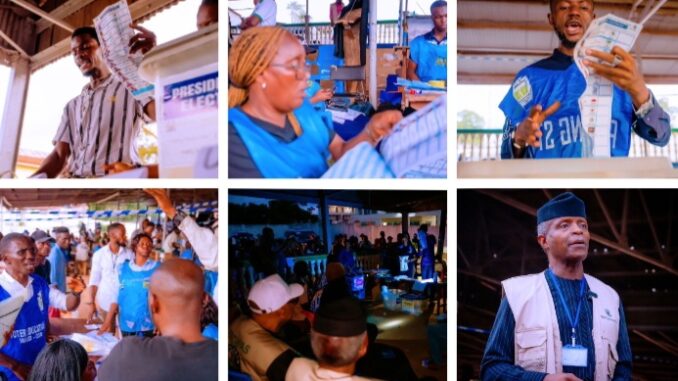
Counting of votes has started across polling stations after Sierra Leoneans trooped out in large numbers to cast their ballots in the country’s presidential and parliamentary elections on Saturday, January 24, 2023.
The voters, some of whom said the election was largely peaceful, are awaiting the results of their ballots expected to be released in at least 48 hours after the close of ballots according to the electoral rules, casting their ballots in an exercise that witnessed a high turnout of voters.
Meanwhile, the Chairman, Commonwealth Observer Group (COG), Nigeria’s immediate past Vice President, Prof Yemi Osinbajo, SAN, making comments on his team’s activities as voting was underway said, they were keenly watching the voting exercise.
“I am situated at the epicentre, Freetown, keenly watching the first voters exercise their rights. My dedicated team has spread out across the country, prepared to witness and oversee the conduct of this democratic process.
“We had the privilege of observing several polling areas in Freetown. Additionally, I took the opportunity to visit and receive comprehensive briefings from dedicated staff and volunteers involved in the commendable work of various civil society election situation rooms.
“Their efforts are crucial in ensuring transparency and accountability in the electoral process,” Prof Osinbajo said.
The election was largely a keen contest between the incumbent President and candidate of the Sierra Leone People’s Party (SLPP), Julius Bio, seeking re-election and the candidate of the major opposition party, Samura Kamara, of the All Peoples Congress (APC).
ALSO READ: Sierra Leone votes in high-stakes polls, Osinbajo’s COG monitors elections
In all, 13 candidates participated in the presidential election, they include Bah Mohamed Chernoh of the National Democratic Alliance; Coker Prince, People’s Democratic Party; Jonjo Mohamed, Citizens Democratic Party; Kabuta Henry, United National Peoples Party; and Kakay Iye, Alliance Democratic Party.
Others are Kamara Musa, Peace and Liberation Party; Margai Francis, People’s Movement For Democratic Change; Saccoh Dougakoro, Revolutionary United Front Party; Sandy Patrick, National Unity and Reconciliation Party; Sowa-Turay Mohamed, United Democratic Movement; and Williams Victor, Republic National Independent Party.
Sierra Leonean voters also cast their ballots for members of parliament and local councillors in what is the fifth election since the end of the country’s civil war, 21 years ago.
Some voters who applauded the voting process said “it was smooth,” despite ballots opening hours late in some areas.
Sierra Leone’s President Julius Maada Bio, has been criticised for presiding over a nation in deep economic crisis by the opposition party who has vowed to unseat him from power.
About 3.4 million people were registered to vote in the presidential and parliamentary ballot after a campaign marred by tensions that led to the cancellation of rallies in the final stages and clashes at an opposition gathering on Wednesday.
Bio, 59, is running for a second term against 12 opponents. The race is expected to be close between the incumbent and the All People’s Congress (APC) Samura Kamara, who narrowly lost to Bio in the last election in 2018.
“I’ve checked with other districts, towns and polling centres and I’m happy with the process,” Bio said as he voted at a polling station in the capital Freetown in front of an excited crowd.
But by the end of the day, there were reports that some polling stations had opened late or run out of ballot papers. Reuters was not immediately able to verify the reports.
The main opposition APC also said their election representatives were attacked and intimidated in three districts, highlighting the tense backdrop to the vote.
Polls closed at 5:00 p.m. local time and vote-tallying commenced. Provisional results are expected within 48 hours, according to the information ministry.
While no leader in office has lost the presidency in the West African nation’s recent history, the APC has banked on an enduring cost-of-living crisis tipping the balance in its favour.
Inflation soared to its highest level in over 20 years in 2022, while the national Leone currency slumped 60 per cent in value.
“We have been yearning for change,” said first-time voter Abu Koroma, 23, as he waited in an hours-long queue at a polling station in a hilltop district of Freetown earlier in the day.
“We’ve had different leaders since gaining independence, but we are yet to have sustainable electricity, sustainable health, all these things a young person like me needs.”
The current downturn has stalled hopes of economic progress in the wake of the devastating Ebola epidemic that peaked in 2014 and the 1991-2002 civil war. Widespread underemployment persists with over half of the population living in poverty, according to the World Bank.
Bio’s camp blames the economic malaise on external factors such as the COVID-19 pandemic and the war in Ukraine. His chances have been boosted by the support of another opposition leader, Kandeh Yumkella, who came third in 2018 and is not running this time.
Two days ahead of the vote, Information Minister Mohamed Rahman Swaray said if Bio retains the presidency, he will focus on job creation and agricultural development to kickstart growth and improve living standards.
“We will do a lot more things to ensure people are comfortable,” he told Reuters in an interview in a Freetown cafe.
Unusually violent protests last year over rising prices have raised fears of political unrest. Bio and Kamara reported small-scale attacks on their supporters ahead of election day, while the APC’s recent questioning of the independence of election officials has raised tensions.
Both sides have called for calm. But there are concerns the situation could deteriorate, particularly if no candidate secures 55 per cent of votes cast, triggering a runoff between the top two candidates two weeks after the announcement of the first-round results.
On Friday, Kamara told Reuters he was concerned about the possibility of vote-rigging. Asked if he would accept the outcome of the vote, he said: “It’s not me. The acceptance has to come from the people… so it is the people we will listen to.”

